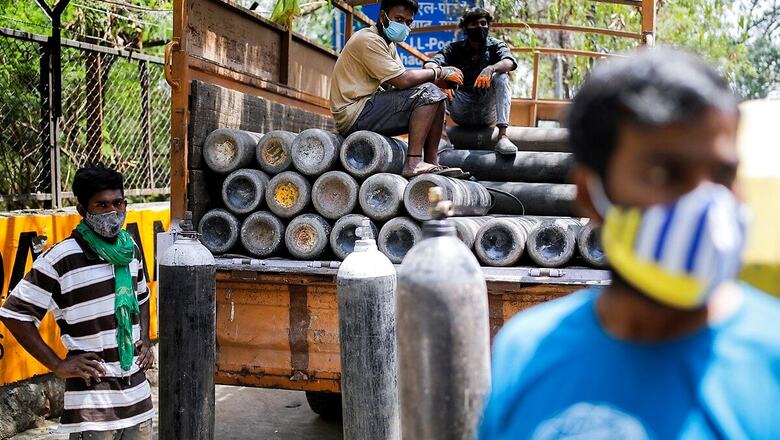
views
As Delhi hospitals faced a severe oxygen crisis for the third consecutive day, the DDMA roped in three senior bureaucrats on Thursday to ensure a smooth movement of tankers and facilitate oxygen supply to the needy establishments, and directed the police to provide the security logistics from the manufacturers’ sites to various health facilities in the city.
The move came hours after Deputy Chief Minister Manish Sisodia alleged that the police in Uttar Pradesh and Haryana were blocking oxygen transportation to Delhi and urged the Centre to ensure normal supply even if that meant taking the help of paramilitary forces.
The Delhi Disaster Management Authority (DDMA) also set up a round-the-clock control room to redress grievances and complaints from the city hospitals within 30 minutes. All the hospitals will have to appoint an audit committee for supervising and rationalising the use of medical oxygen.
Several small hospitals in the city struggled to replenish their oxygen supplies for coronavirus patients throughout the day. Sisodia wrote to Union Health Minister Harsh Vardhan in the evening, saying six hospitals in the national capital have exhausted their oxygen supply while seven have less than five hours of oxygen remaining.
In his order, Chief Secretary Vijay Dev, who is also the chairman of the DDMA executive committee, said the Delhi Police would keep a record of the entry and exit of all oxygen tankers through various checkposts to monitor their movement. The police will immediately share the record of entry and exit of the tankers at the checkposts with the control room, the order said.
The liquid medical oxygen will be distributed among all hospitals run by the Centre, the Delhi government as well as private players under the overall supervision and control of Officer on Special Duty (Delhi health department) Ashish Verma. He will be assisted by two other senior IAS officers — Vijay Bidhuri and Udit Prakash Rai. Rai will be responsible for ensuring a smooth and seamless movement of the tankers till the borders of Delhi and sorting out all the issues pertaining to the suppliers, the states and the Centre, Dev said in the order.
Bidhuri will be responsible for controlling, coordinating and facilitating the supply of oxygen to the hospitals. According to the DDMA order, Delhi Police’s Special Commissioner (operations) Muktesh Chander will function as the nodal officer, supervising the green corridor provided to the tankers.
He will provide all help, support and security logistics as regards the movement of the tankers from the manufacturers’ sites to the hospitals. The DDMA said there will be a help desk at the control room, which will be manned by an SDM-level officer and eight other officials for redressing the grievances and complaints from the hospitals.
“If the grievances are not redressed within half an hour, Bidhuri will look into it,” it added. The hospitals will also appoint nodal officers, who will be available round the clock to redress grievances related to oxygen supply, the order said.
Amid a shortage of medical oxygen being faced by the hospitals, the Centre increased Delhi’s quota from 378 MT to 480 MT per day on Wednesday. Chief Minister Arvind Kejriwal has said all the suppliers of medical oxygen, who provide Delhi its quota, are based in other states. The government is also trying to airlift medical oxygen from Odisha.
A sudden spurt in COVID-19 cases and a high positivity rate have led to a large number of hospital admissions. Many of the patients are on supplemental oxygen and under ICU care and this has led to a quantum jump in the medical oxygen requirement of the hospitals, the DDMA said.
In many cases, the existing contractual arrangements have either been disturbed or a hospital’s oxygen requirement has exceeded the contractual quantity, causing a “widespread disruption” in the supply chain that has led to a “precarious situation”, the DDMA order said. “Local supply side disruptions in the neighbouring states is leading to wide variation in day-to-day delivery of oxygen to Deihi,” it added.
Allocation and supply of oxygen to all health establishments will be strictly regulated in accordance with the allocation orders issued by the government from time to time, the DDMA said. The order will specify the daily allocation in respect of all health establishments as well as the inter-se distribution amongst different suppliers, it added.
Delhi logged 24,638 fresh COVID-19 cases and 249 deaths due to the viral disease on Wednesday, while the positivity rate stood at 31.28 per cent, meaning almost every third sample tested positive, amid a growing clamour for oxygen and hospital beds in the city. On Tuesday, the city had recorded 28,395 cases and 277 fatalities, both highest since the outbreak of the pandemic. The positivity rate was 32.82 per cent, also the highest so far.
The city has reported over 1,350 deaths due to the deadly virus in the last seven days.
Read all the Latest News, Breaking News and Coronavirus News here. Follow us on Facebook, Twitter and Telegram.














Comments
0 comment